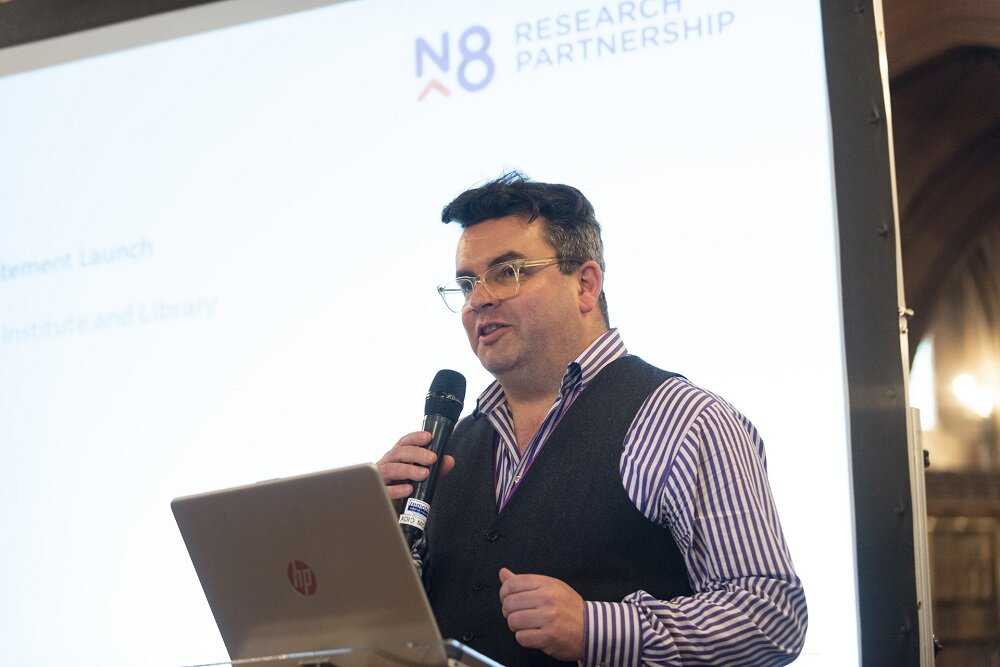
Professor Christopher Pressler, John Rylands University Librarian at the University of Manchester
Rights Retention is the next step on the journey towards a fully open access global research environment. It allows our researchers to retain copyright and Intellectual property on their work and in so doing place that research immediately on publication in our repositories regardless of publisher’s embargoes. Without this ability researchers will find themselves caught between those publisher policies and many funders’, including UKRI mandates on immediate open access.
There are many challenges facing universities and indeed the world at this moment. Our capacity and resolve to meet those challenges through research and innovation has never been more determined. Although the great breakthroughs and discoveries in research are the aspects of our work that makes the news, the many processes and teams in the background that support this work are equally important.
The role of the library and our research offices are a part of that infrastructure and formal policies such as rights retention ensure that control over their ideas remain with the researchers who authored them.
The Rights Retention Statement has been fully adopted by Senate here in Manchester and is going through similar steps in our partner N8 universities. Manchester, for example now has a Publications Policy tailored for the 21st Century, where the purpose of our research, to improve and ensure equality in society will be maximised by access to world-leading research for global scholarship. This initiative originated in our libraries but is very much a team effort across our faculties, research support and legal teams.
We are excited to be able to support our combined research community as they work within the new context of the UKRI OA Policy, mandating immediate Open Access to research on publication. Much research will be covered by gold OA agreements but for those outside such licenses the green OA route, whereby researchers can deposit their papers in institutional or discipline-specific repositories on publication, will be made possible by asserting rights already held by researchers on submission to publishers.
Although the Rights Retention Statement being adopted across all eight Northern research-intensives originally began as a discussion between the N8 libraries, it is formally supported by senior leaders for research and VCs throughout the N8 Research Partnership. We believe that we are stronger when we act together and from the same position. This is the first consortia statement on this vital issue in the UK and draws on the very significant research power of the Northern research-intensive universities.
It was fitting that the symposium on the Future of Research Publishing and the launch of the N8 RRS was held at The University of Manchester’s John Rylands Library, one of the acknowledged great libraries of the world. Such a Library is representative of the role libraries play in society in terms of caring for historical knowledge in the context of influencing the future. This initiative is made possible by libraries and researchers working closely together within the vibrant context of the N8 Research Partnership and in so doing provides an example of leadership and collaboration in the ever changing world of research publishing.
This is a new area of development and although there are some documented cases of push back from publishers to academics asserting their rights these are rare. We assume it is because, although not historically standard academic practice, it has always been known that researchers (or indeed their institutions) hold copyright on their work and not the companies that publish it. Rights Retention is aimed at situations where gold access is not achievable whilst at the same time green (immediate on publication) has been embargoed or directly blocked by a publisher in order to maximise sales. This situation is now in direct conflict with many funder’s policies and the N8 RRS is designed to support researchers who find themselves caught between the two.
At Manchester we have a large team of librarians, legal advisors and researchers coordinated by The University of Manchester Office for Open Research, based in the library who can support academic colleagues through every part of the process, including if they find their submissions rejected because they assert their legal right to deposit in green repositories.
The N8 Rights Retention Statement matters because for decades the sector has struggled to initiate progress towards open access. At the root of this has been the transfer of intellectual property of submitted research outputs to publishers by researchers. This once standard practice has slowed progress in open science and public access to research by at least thirty years.
The sector, it must be admitted frequently led by university libraries, has in the past been forced to negotiate change, rather than work in real partnership with publishers leading to further years of slow movement on transformative agreements where subscriptions are replaced by accepted OA charges. Without Rights Retention the sector is still giving research IP to publishers and buying access to it in perpetuity. It is, to put it mildly an unhelpful model, as aside from journal distribution and marketing almost all peer review and content development is also delivered by Faculty, not publishers.
Rights Retention sits alongside long overdue mandates for immediate OA, such as the UKRI OA Policy and is a significant step forward, not least in ensuring OA can happen on publication but also in redressing the unfortunate practice of universities giving away IP or copyright to publishers who then hold all the cards in negotiating price to access those same universities’ content. Rights Retention means researchers will for the first time have a strong hand in terms of control over their own work and transforms the position university libraries often find themselves in when negotiating with suppliers who claim ownership over content produced by those same universities.